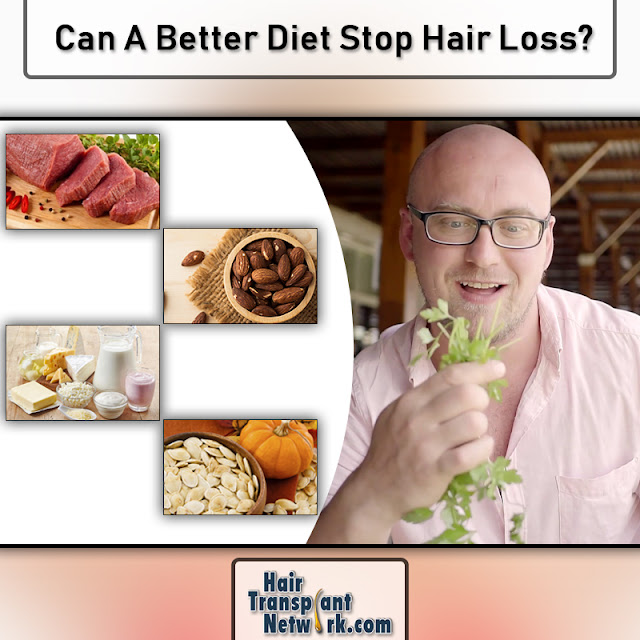Can A Better Diet Stop Hair Loss?
Can A Better Diet Stop Hair Loss?
A poor diet is linked with obesity and obesity is linked with heart disease, diabetes, cancer, liver disease and many other chronic health conditions. Many believe that modern day diets are causing hair loss in many men and women. Every day we are reminded that the obesity epidemic continues to grow worldwide, but what about hair loss? Is that related to a poor diet too? In this article, we will be discussing whether or not a nutritious diet can help stop hair loss.
What Causes Hair Loss?In order to understand whether a specific diet will work to treat hair loss, the hair loss sufferer must first understand what kind of hair loss they are experiencing. There are several forms of hair loss, but the most common form of hair loss is androgenic alopecia (genetic hair loss). Individuals who suffer from male and female pattern baldness inherit a gene that causes certain hair follicles to become vulnerable to the effects of dihydrotestosterone (DHT). DHT is the main hormone responsible for causing hair loss in men and women.How Can Someone’s Diet Affect Their Hair LossThere are several vitamins and minerals responsible for promoting new hair growth and maintaining hair growth. However, a deficiency that would cause noticeable hair loss is extremely rare. Even a poor diet by modern standards has enough nutrients to maintain and grow new hair. What are some of the vitamins and minerals that aid in keeping hair follicles healthy? Some of them are Vitamin C, Niacin, Calcium, Iron, Zinc and Biotin. All of these vitamins and nutrients can be found in multiple food sources and even in over the counter multi-vitamins that are cheap and easy to find. For instance, Biotin can be found in beef, eggs, salmon and cheese. Calcium can be found in most dairy products including milk, iron can be found in spinach, red meat, pumpkin seeds and quinoa. Zinc can also be found in red meat, fish, pumpkin seeds, almonds and most dairy products. These vitamins and minerals are even in a lot of the fast food that we consume.What Actually Works to Stop Hair Loss?Currently, there are two hair loss treatments that have been approved by the FDA and proven to treat androgenic alopecia (genetic baldness). The medications are Propecia (finasteride) and Rogaine (minoxidil) and have been clinically proven to be effective. Propecia (finasteride) is a 5-alpha reductase inhibitor, the 5-alpha reductase enzyme is responsible for converting testosterone in to DHT through the blood stream. Propecia can inhibit up to 70% of DHT in the body thus slowing, stopping and even reversing hair loss in some individuals. Unfortunately, women cannot take Propecia (finasteride). Rogaine (minoxidil) is a topical vasodilator, it increases blood flow and prolongs the anagen (growth) phase of the hair follicle, which means that there are more terminal hair follicles on the head at any given time. Rogaine (minoxidil) is the only FDA approved treatment that can be used by both men and women.Also, Propecia comes with a list of potential side effects. Though reported as rare, some of them are very serious and can be permanent. This, anyone considering Propecia should consult a doctor before taking this medication.Keep in mind also that these non surgical solutions are much better at slowing down or stopping the progression of hair loss and rarely grows new hair. Only hair transplant surgery is proven to grow hair in completely bald areas.




Comments
Post a Comment